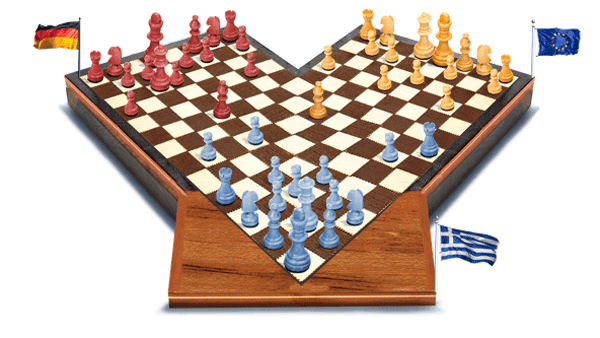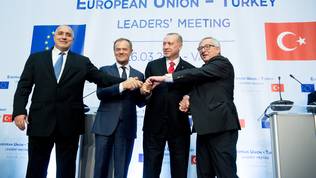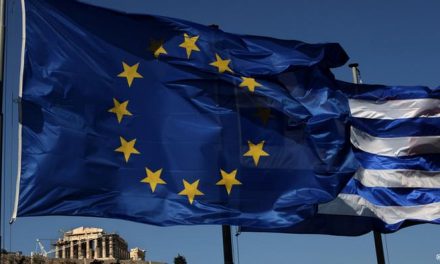By JAMES B. STEWART, New York Times
That Yanis Varoufakis, the rakish Greek finance minister, would meet with senior European officials wearing a leather motorcycle jacket and open-collar shirt would probably have fascinated John F. Nash Jr., the Nobel prize -winning mathematician, game theorist and Princeton professor who was thrown from a taxi and killed last month.
Is Mr. Varoufakis really a radical, or simply acting like one to increase Greece’s negotiating leverage — what game theorists mean when they say it can be rational to behave irrationally?
Mr. Varoufakis is himself a noted game theorist, co-author of the textbook “Game Theory: a Critical Introduction” and a longtime admirer of Dr. Nash. The two met in Athens in June 2000 after Dr. Nash delivered a lecture on money. After learning of Dr. Nash’s death, Mr. Varoufakis wrote on Twitter: “Reading your work was inspirational. Meeting you, and spending time together, was an unearned bonus, Farewell John Nash Jr.”
The intense and hard-fought negotiations between Greece and its creditors, which have roiled global financial markets for months and appear to be nearing a climax, are the sort of high-stakes game that fascinated Dr. Nash, who won the Nobel in economic science, and lend themselves to the analysis he pioneered. On Thursday, markets were rattled when Greece deferred a payment to the International Monetary Fund as it continued to seek a new debt deal.
Yanis Varoufakis, Greece’s finance chief, brings a background in game theory to the complex dynamics of the bailout, says James B. Stewart. By CNBC on Publish Date June 5, 2015. Photo by CNBC.
“It’s exactly the kind of game that Nash had in mind,” said Sylvia Nasar, author of the definitive Nash biography “A Beautiful Mind,” which was the basis for the Academy Award-winning movie. “There are more than two players. They have common as well as opposing interests. Not making a deal leaves everybody worse off.”
Unfortunately for the financial markets and the future of the European Union, that’s no guarantee that Greece and its creditors will reach a deal that averts the doomsday scenario — a debt default by Greece that could cause it to lose its membership in Europe’s currency union and set off another crisis.
I asked Mr. Varoufakis this week how it felt to have the fate of the global economy to a large extent resting on him.
“I don’t really feel the weight of the world economy,” he said. “I feel the weight of the Greek people resting on my shoulders. If little Greece, in order to survive, brings down the financial world, it can’t be our fault. It would be as if Delaware brought down the United States economy. That would be the fault of the U.S., not Delaware.”
Virtually everyone agrees that a default by Greece is the least desirable outcome for both Greece and its creditors — among them Germany and France; the European Central Bank; and the I.M.F. Yet one of Dr. Nash’s critical insights is that there may be many possible outcomes — so-called Nash equilibriums — that produce suboptimal results. A Nash equilibrium exists when each side’s strategy is optimal given what they believe to be the others’ strategy.
For example, if Germany and other creditors don’t believe Greece’s threat to default, and underestimate the severity of such an outcome, they might see their optimal strategy as remaining firm in their demands for Greek fiscal austerity and structural reforms. If, on the other hand, Germany believes Mr. Varoufakis to be ideologically motivated to reject further austerity, it might well cave to Greek demands for leniency.
That may be part of Mr. Varoufakis’s strategy — his colorful demeanor and public statements have been so provocative that in April Greece lessened his role in the negotiations, a move that seems only to have enhanced his considerable popularity back home. He continues to be a leading player in the talks and remains a key adviser to the Greek prime minister, Alexis Tsipras.
In our conversations this week, Mr. Varoufakis came across much more the sober economist than a wild-eyed radical or motorcycle-riding daredevil. He displayed a sophisticated grasp of both game theory principles and the complicated dynamics of the current negotiations between Greece and its creditors.
Those on the other side of the negotiations are “portraying me as an irrational fool, which is doing my work for me,” Mr. Varoufakis said. “I’ve been stoic. I haven’t let myself get agitated.” Speaking like a true game theorist, he added, “I know who I am and I know they know who I am.”The relatively simple game of chicken is often invoked to illustrate Greece’s situation, but it’s only superficially relevant. That’s because in a game of chicken — in which two cars drive toward each other on a narrow road with neither willing to turn aside — the parties don’t communicate before making a decision, yet Greece and its creditors have been talking for months. And while the worst-case outcome with Greece is unpredictable, the worst-case outcome in chicken is known — a car crash and likely death.
Greece is much closer to Nash’s complicated scenarios, said Barry Nalebuff of the Yale School of Management, a game theory expert. “Both sides agree it’s better not to push Greece over the cliff. But how far can you push? Each side knows the other side should be willing to make concessions because it’s in their interest. Neither side does because they believe the other side will. So there’s a standoff. It’s very hard when it’s in both side’s interests and there are multiple solutions or equilibria, which is the situation with Greece.”
Mr. Varoufakis agreed that in the Greece example, “the game has multiple equilibriums and, therefore, a failure to agree may trigger a chain of outcomes that no one can either predict or control.” He added, “We have many interlocutors. Some are painfully aware of the disaster that awaits Europe if Greece defaults. Others are less aware. Some are utterly unaware. They think it can be contained. There’s a great divergence of opinion on the other side regarding the potential outcome. Even in Germany, there are many divergent views.”Uncertainty of outcome vastly complicates any game theory analysis. Citing the work of the University of Chicago professor Frank Knight, Mr. Varoufakis pointed to the difference between risk and uncertainty. Betting on the flip of a coin involves high risk, but the potential outcomes and probability are known. “Uncertainty is when you can’t know all the outcomes or the probability with which each potential outcome will occur,” he said. “This is deep uncertainty.” Complicating matters further, “these negotiations are also about hearts and minds, both of the participants and of the wider community — investors, citizens in Greece and outside of Greece. Those who think that game theory can cut through this Gordian knot are badly mistaken.”
Advertisement
Continue reading the main story
Advertisement
Continue reading the main story
Advertisement
Continue reading the main story
Kenneth Rogoff, the Harvard economist and expert in financial crises, agreed the uncertainty of outcomes should Greece default has contributed to the continuing impasse. “Would a Greek default be contained? Would it trigger another global financial crisis? Greece is in a tough situation regardless,” he said. The Germans might underestimate the risk of contagion from a Greek default, as the United States government underestimated the consequences of a Lehman Brothers failure. “It’s a mess,” Mr. Rogoff concluded. “If you’re in a game where we don’t know what will happen, game theory has little predictive power.”
No one I spoke to this week thinks the situation is hopeless. Mr. Nalebuff said that one of Dr. Nash’s most important contributions is the notion of allocentrism, which requires parties to assess the others’ interests in order to understand their bargaining position. (It’s the opposite of egocentrism.) In order to know how far they can push Greece, its creditors need to “understand the interests and objectives of the Greek government. And Greece needs to come up with a solution that works for Germany,” Mr. Nalebuff said. “This could be very constructive,” although it’s no guarantee that an optimal solution will be reached.
The Greek government submitted a new set of proposals this week, and while details remained under wraps, Mr. Varoufakis told me: “Of course we tried to understand what they want. We’ve been in negotiations for over three months, so we know what they want. We’ve tried to bend over backwards and we’ve accepted conditions that were very difficult for us to swallow.” He said the latest Greek proposal accepts the need for structural reform, including the hot-button issues of pension and tax reform, in return for “a few debt swaps and less austerity.”
“What’s radical about that?” he said. “It’s something a Wall Street bankruptcy lawyer might have come up with. These days you propose something sensible and it’s considered radical.”
European leaders met Wednesday in Brussels, with some hinting at compromise. Still, no deal has emerged. “I think they will try to take us to the wire to see if we fold,” Mr. Varoufakis said. “There are elements that want to go back and tell their constituencies, ‘We humiliated the Greek government.’ There are elements that want us to fail, hoping that our government will be replaced. This isn’t constructive. Sometimes I wish they had a skilled game theorist on their side.”
Of course, Dr. Nash himself would have been the first to acknowledge that game theory can only go so far with a complex real-life situation like Greece.
“Game theory gives you wonderful analytical tools, but it can’t predict the outcome,” Mr. Nalebuff said. “On the other hand, if you don’t employ the reasoning behind game theory, I have no idea how anyone would analyze the situation.”



















